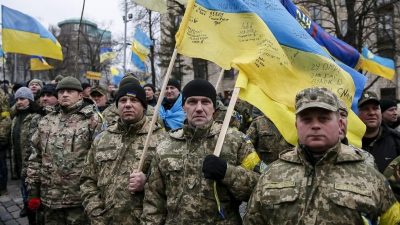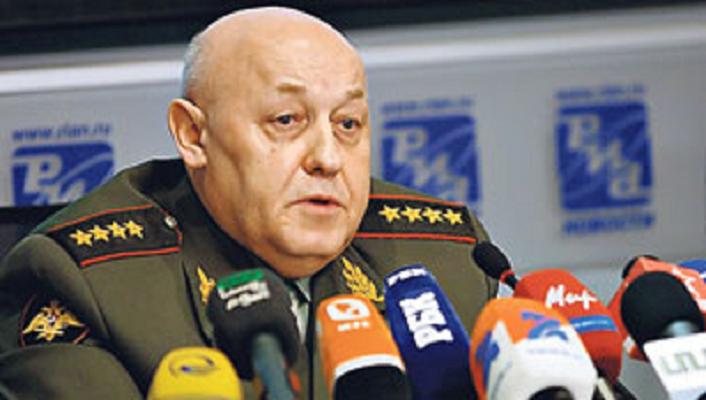Ukraine and Georgia Joining NATO Crosses an Unacceptable Red Line for Russia

Reagan era Secretary of State James Baker’s “ironclad” pledge to Mikhail Gorbachev not to expand NATO “one inch eastward” was flagrantly breached by the Clinton presidency and subsequent US administrations.
Today, US-led NATO forces surround Russia, posing a major threat to its security. Ukraine and Georgia so far aren’t part of the alliance – involved in US-led aggression since since the 1990s. Both countries border Russia, Ukraine especially important.
It shares a near-1,500 mile land and sea border with the Russian Federation, the longest Western frontier with the country.
In 1995, Ukraine became the first former Soviet republic to join NATO’s so-called Partnership for Peace, a notion the alliance abhors.
At the time, Bill Clinton called the initiative a “track that will lead to NATO membership” for countries joining it.
In 1997, a NATO/Ukraine Commission was formed. In 2008, Ukrainian President Viktor Yushchenko, Prime Minister Yulia Tymoshenko and parliament chairman Arseniy Yatsenyuk signed a statement, calling for consideration given to the country’s alliance membership.
Around the same time, Vladimir Putin said
“(t)he appearance on our borders of a powerful military bloc…will be considered by Russia as a direct threat to our country’s security,” adding:
Russian missiles will target Ukraine if it joins NATO or allows Washington’s (solely for offense) missile defense shield to be installed in the country.
Then Russian Foreign Ministry spokesman Mikhail Kamynin said
“the course of the Ukrainian authorities toward integration into NATO” is unacceptable for Moscow.
Russian international affairs parliamentarian Konstantin Kosachyov said
“(b)ilateral cooperation between Russia and Ukraine in the security sphere…will end if Ukraine joins NATO.”
In May 2014, following the February coup, Foreign Minister Sergey Lavrov said the
“seeds for (crisis conditions in Ukraine) were sown in 2008 in April during the NATO summit in Bucharest, when NATO leaders stated in a declaration that Georgia and Ukraine would be in NATO,” adding:
“(A)ttempts to draw Ukraine into NATO would be negative for the entire system of European security and we would be categorically against it.”
Changing Ukraine’s neutral military status is out of the question for Moscow – especially given Washington’s flagrant breach of its pledge not to advance militarily toward Russia’s borders.
“The real aim of the United States is not to let Europeans go on their own…keep(ing) Europe on a short leash,” using NATO as a weapon against Russia and other countries, said Lavrov.
In November 2014, months after the Obama regime’s coup in Ukraine, replacing its democratic governance with a government integrated by neo-Nazi parties, Kremlin spokesman Dmitry Peskov called for “a 100% guarantee that no-one would think about Ukraine joining NATO.”
US-installed NATO Secretary-General Jens Stoltenberg rejected the demand, claiming acceptance would “violat(e) the idea of respecting the sovereignty of Ukraine, which is a fundamental.”
Longstanding US plans call for accession of all former Soviet republics and Warsaw Pact countries into NATO – the objective supported by all US presidents since the Clinton era.
Since the dissolution of Soviet Russia in 1991, Ukraine has been “seen as the decisive linchpin in plans by the US and its NATO allies to effect a military cordon sanitaire severing Russia from Europe,” STOP NATO’s Rick Rozoff earlier explained.
Since the late 1990s, the US-dominated alliance has been “incrementally absorb(ing)” Ukraine as a member” – a key bipartisan-supported Washington objective, strongly opposed by Russia.

In 2008, then-Russian military chief General Yury Baluyevsky (image on the right) explained the country would be forced to greatly strengthen its border security with Ukraine and Georgia if these countries join NATO, saying:
“Russia will undoubtedly take measures to ensure its security near the state border. These will be both military and other measures,” declining at the time to elaborate further, adding:
“Ukrainians are unanimously against Ukraine joining NATO.” Most Georgians support the idea.
Last July, Vladimir Putin said Russia is forced to “react to what’s going on around us,” adding:
Granting NATO membership to Ukraine and Georgia will have “extremely negative” consequences.”
“For us…it’s a direct and immediate threat for our national security. (M)oving this NATO infrastructure towards our borders would be a threat, and the reaction would be extremely negative.”
“It is a concern for us since the NATO is expanding its infrastructure and facilities. The number of servicemen is on the rise in the regions where they shouldn’t be.”
“This (violates) treaties between Russia and NATO. And this is a destabilizing factor, which we have to factor in” and react to accordingly.
Last August, Russian Prime Minister Dmitry Medvedev said accession of Georgia to NATO could trigger “a terrible conflict” with potentially catastrophic consequences. The same goes for Ukraine joining the alliance.
In late October, Russian Defense Minister Sergey Shoigu warned that Russia “will act” if Ukraine and/or Georgia join NATO – calling their accession if happens the “militarization of the European continent” against Russia, adding”
“We are following (NATO’s policy) with alarm…We see efforts being made to involve more and more NATO member countries, I mean the Balkans first of all.”
Russian Foreign Ministry’s European cooperation department director Andrei Kelin said
“(w)e will have to create a defense belt near Sochi. We will have to spend colossal resources on preventing likely actions by a hypothetical enemy, this is inevitable,” adding:
“The length of our common boarder (with Ukraine) is enormous. It is utterly unequipped, so we will have to build defense lines there and to shift the emphasis of our defense structures towards the south.”
If US-dominated NATO “proceed(s) along the road of building up confrontation…we will have to make fundamental preparations.”
During Vladimir Putin’s tenure as Russian president, relations with Washington deteriorated markedly, notably after the US-orchestrated coup in Ukraine.
With unrelenting US bipartisan hostility toward Russia, there’s virtually no chance for improving ties.
Provocative US-led NATO actions undermined mutual trust. Cold War 2.0 far exceeds the earlier danger – things likely to deteriorate further ahead, risking possible direct military confrontation.
*
Note to readers: please click the share buttons above. Forward this article to your email lists. Crosspost on your blog site, internet forums. etc.
Award-winning author Stephen Lendman lives in Chicago. He can be reached at [email protected]. He is a Research Associate of the Centre for Research on Globalization (CRG)
His new book as editor and contributor is titled “Flashpoint in Ukraine: US Drive for Hegemony Risks WW III.”
http://www.claritypress.com/LendmanIII.html
Visit his blog site at sjlendman.blogspot.com.
Featured image is from Crisis Group.

